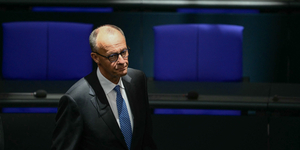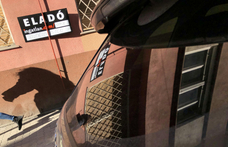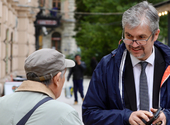We are sitting in a small village in Pest county. You recently moved away from Budapest, the city of which you have just been made an hon orary citizen. Were you escaping?
 © Marton Szilvia |
I very much enjoyed living in Budapest. It was the gate that opened up first Hungary, then the world for me. My jobs also tied me to the city. The theatres, the Academy, Parliament were all nearby. But as I became successful, this community became a burden. I received invitations both at home and abroad, I was asked for interviews, I was given prizes. Fuer Elise, my autobiographical work, was published four years ago, and readers reacted with great enthusiasm. I knew I had to prepare to continue, but for this I needed to withdraw from the world a little. Look around you, is there a better place for that than here? There are trees and flowers everywhere. The fields are just a few steps away. I love this house and the way my friends and animals are so close to me.
You must have seen many sides of Budapest over your life. Are you not worried by what is happening in the capital at the moment?If I had a tendency towards despair, I would not have come to Pest in 1945. But I felt then what I feel now: I cannot be an indifferent, outside observer of the nation's suffering. I had the chance to hear Hitler speaking live from the balcony of the Hotel Imperial in Vienna, and on the way home afterwards I was slapped so hard on the face by a German soldier that I thought the sky had fallen in. After that, there isn't much you can show me that is new. But I like spectacle in the theatre. This is why I wrote so many dramas. But I have no talent for political hysteria. For any kind of hysteria at all, for that matter. When they told me my father had died, I just said: "Yes." Even though I loved him very much.
How do you keep yourself informed. Whom do you believe when political events are interpreted in so many different ways.
I read two or three newspapers. But my visitors also tell me what's happening in the world, as do the people who shop for me. Even my animals tell me. There has never been a time when people didn't come up to me to introduce themselves.
Literature supposedly sets the moral framework. Many people would like writers to be a kind of moral compass. But they see that even writers take up opposing political positions.
People have just one soul. I'm not giving mine to anyone apart from the Good Lord. Of course, I'm not a pure civilian. My job as a writer is to record the problem. But it's for the country to solve them. I'm the last of my generation of writers. I have lived through so much. I was silenced and celebrated. I was accused of being a dim provincial writer and then praised for my prophetic ability. People have tried to persuade me of so many things. They told me what I should be glad about, what I should mourn. And it's no different today.
But even today it is not clear where people stand. Do you know?I've just got home, I haven't read the papers yet. The situation in Hungary changes by the minute. There are times to resist, times to help, and times when people simply have to accept they're not doing their job.
And what kind of time is it now?It's time for work. I have to write the second part of Fuer Elise. I don't have time to go away anywhere. I am a Hungarian writer, I serve the aims of our great Hungarian literature. I concluded the first part of Fuer Elise with my leaving this country for Vienna at a crucial time. Now I have to show that world, when Hitler's ideas were conquering Austria and when the skies were growing dark over Vienna.
Every historical novel has a certain resonance. How will people read what you write about the Anschluss in 2006?I have no idea. Everyone will see it in their own way. Someone who's concluded that this was a terrible time will read it in that light. Someone who sees it as the time that fascism bloomed will have another kind of reading. In all my autobiographical writings, whatever period I was depicting, I was researching the world into which I was born. I can't help it if sometimes certain aspects might crop up that people recognise in today's world.
You have just been made an honorary citizen of Budapest. Debrecen has already paid you the same honour. You lived abroad for a long time, and there, too, you piled up the prizes. Where are you at home? Is there any point in local patriotism in such an open world?Of course there's a point to it! Where do you think I live? Vienna? Did I marry my Austrian suitor? If you had asked me where I sleep? I sleep here, but if I'm in Debrecen, then I lay down my head and sleep as if I'd been knocked out. A few years ago Bishop Gusztav Bolcskei gave me the keys to the Great Calvinist Church of Debrecen. I could claim that my people runs from the River Tisza to the Romanian border.
Where does this strength and freedom that people always notice about you come from?I had very clever parents. I grew up in a family where they understood with great tolerance that a child has an independent life and expresses independent thoughts. My father said I should read the newspapers and ask about what I didn't understand. Pessimism is foreign to me. Do you know how many times I might have died? As a child, as an adult, from illness, in war, in persecution - and it could still happen today. I always understood that what the current moment brought, it could also take away. If I can and must, then I act, but if I can't, then God will act in my interests.
JÁNOS DOBSZAY
















